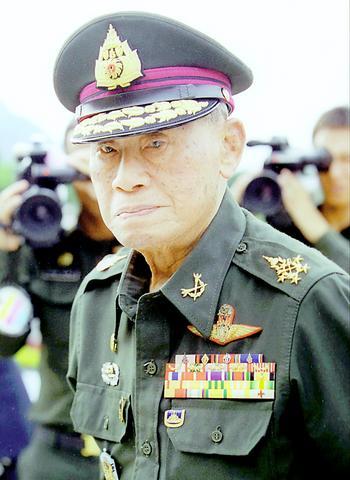Thanom Kittikachorn, a former prime minister whose military regime was ousted from office by a popular uprising in 1973, has died, the state-run news agency said. He was 92.
Thanom died of shock and heart failure late Wednesday after spending five months at Bangkok Hospital, the Thai News Agency reported, citing a hospital announcement early yesterday morning.
Thanom came to be popularly reviled as one of the country's "Three Tyrants" when he ran the country as a military dictatorship in a triumvirate in the 1960s and early 1970s with Field Marshal Praphas Charusathien and Colonel Narong Kittikachorn, Thanom's son and Praphas' son-in-law.

PHOTO: AFP
Thanom, who also held the rank of field marshal, was generally seen as the more conciliatory partner, and Praphas the hardliner.
The three were driven into exile following a bloody student-led uprising in October 1973.
They were accused of nepotism, massive corruption and ordering the massacre of protesters in the streets of Bangkok during the uprising.
A brief period of raucous democracy followed, which many influential and conservative Thais found unsettling, and feared would lead to a communist takeover similar to those that occurred in Vietnam, Laos and Cambodia in 1975.
Thanom was allowed to return to Thailand in late 1976 to serve as a Buddhist monk, sparking new demonstrations by pro-democracy protesters. Many believe his return was meant to set the stage for a counterrevolution, and on Oct. 6, 1976, a massacre of student protesters by police and the army took place at Bangkok's Thammasat University, and a coup installed a new, military-guided right-wing government.
Neither Thanom nor his two former partners in rule resumed any public political role. Thanom generally kept a low public profile afterward, though over the past decade, he made an effort to rehabilitate his public image -- arguing that he was not responsible for the violence unleashed on the 1973 protesters -- and sought to recover some property seized when he was overthrown. Praphas died in 1997.
Thanom was born Aug. 11, 1911 in the northern province of Tak. He attended Army Cadet Academy and his move up the ranks was accelerated after he took part in a 1947 coup.
During the 1950s Thanom served as deputy defense minister and defense minister, and was appointed a figurehead prime minister for nine months in 1958 before military strongman Sarit Thanarat assumed dictatorial powers until his death in 1963.
Thanom's regime -- like Sarit's -- was close to the US because of their shared drive against communism, and massive corruption. During the Vietnam War, his government allowed tens of thousands of US servicemen to be stationed in the country. The US bases were closed after his government was overthrown.
His government allowed a veneer of democracy, but even the mild dissent proved unacceptable to it, and it staged a coup against itself in 1971 to sweep away peaceful but pesky opponents in parliament. However, the high-handed tactic sharpened opposition to his rule, leading to the 1973 student revolution.

‘TERRORIST ATTACK’: The convoy of Brigadier General Hamdi Shukri resulted in the ‘martyrdom of five of our armed forces,’ the Presidential Leadership Council said A blast targeting the convoy of a Saudi Arabian-backed armed group killed five in Yemen’s southern city of Aden and injured the commander of the government-allied unit, officials said on Wednesday. “The treacherous terrorist attack targeting the convoy of Brigadier General Hamdi Shukri, commander of the Second Giants Brigade, resulted in the martyrdom of five of our armed forces heroes and the injury of three others,” Yemen’s Saudi Arabia-backed Presidential Leadership Council said in a statement published by Yemeni news agency Saba. A security source told reporters that a car bomb on the side of the road in the Ja’awla area in

PRECARIOUS RELATIONS: Commentators in Saudi Arabia accuse the UAE of growing too bold, backing forces at odds with Saudi interests in various conflicts A Saudi Arabian media campaign targeting the United Arab Emirates (UAE) has deepened the Gulf’s worst row in years, stoking fears of a damaging fall-out in the financial heart of the Middle East. Fiery accusations of rights abuses and betrayal have circulated for weeks in state-run and social media after a brief conflict in Yemen, where Saudi airstrikes quelled an offensive by UAE-backed separatists. The United Arab Emirates is “investing in chaos and supporting secessionists” from Libya to Yemen and the Horn of Africa, Saudi Arabia’s al-Ekhbariya TV charged in a report this week. Such invective has been unheard of

‘SHOCK TACTIC’: The dismissal of Yang mirrors past cases such as Jang Song-thaek, Kim’s uncle, who was executed after being accused of plotting to overthrow his nephew North Korean leader Kim Jong-un has fired his vice premier, compared him to a goat and railed against “incompetent” officials, state media reported yesterday, in a rare and very public broadside against apparatchiks at the opening of a critical factory. Vice Premier Yang Sung-ho was sacked “on the spot,” the state-run Korean Central News Agency said, in a speech in which Kim attacked “irresponsible, rude and incompetent leading officials.” “Please, comrade vice premier, resign by yourself when you can do it on your own before it is too late,” Kim reportedly said. “He is ineligible for an important duty. Put simply, it was

US President Donald Trump on Saturday warned Canada that if it concludes a trade deal with China, he would impose a 100 percent tariff on all goods coming over the border. Relations between the US and its northern neighbor have been rocky since Trump returned to the White House a year ago, with spats over trade and Canadian Prime Minister Mark Carney decrying a “rupture” in the US-led global order. During a visit to Beijing earlier this month, Carney hailed a “new strategic partnership” with China that resulted in a “preliminary, but landmark trade agreement” to reduce tariffs — but